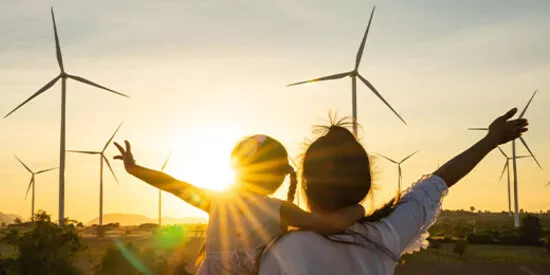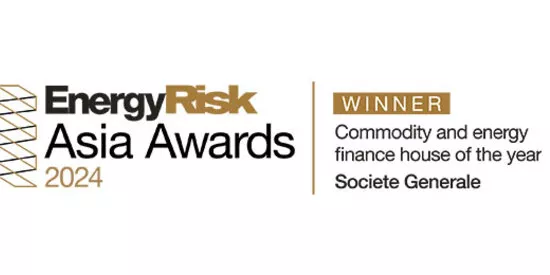
Indonesia looks beyond coal to a green energy future
By Daniel Mallo, Head of Natural Resources & Infrastructure, Asia Pacific, Societe Generale
As Southeast Asia’s largest country, Indonesia is located along the equator and on top of a ring of active volcanoes. It boasts the world’s richest reserves of geothermal energy, receives year-round sunshine and has one of the longest coastlines of any country, ideal for wind farms or tidal generators. This is why despite being one of the world’s biggest producers and exporters of carbon-emitting fossil fuels, we are confident that Indonesia has the potential to be a renewable energy powerhouse.
Indonesia’s renewable energy landscape
Indonesia’s gross domestic product annual growth rate is about 5.5% (excluding Covid-19 impact) and the nation of over 220 million’s demand for power is growing faster at 6.5-7.5%. There is still significant untapped demand for power with millions of Indonesians not having access to electricity in some areas.
With over 17,000 islands, it would be hard for Indonesia’s State Electricity Company (PT Perusahaan Listrik Negara or PLN) to serve them all from a logistical standpoint. As such there will be a number of applications for distributed generated solutions in the form of mini-grids or micro-grids using solar or biomass energy will find their place in meeting untapped energy demands.
Indonesia has tremendous hydro and geothermal resources, which are among the best and the largest in the world. These renewable energy sources have their merits, in particular geothermal energy which is a baseload energy source that is extremely valuable and electricity from geothermal plants could displace coal-based power in Indonesia. However, extracting geothermal energy does require substantial investment costs.
In short, it is all about getting the right diversified energy mix and being able to combine the right sources of energy for global investors to accompany Indonesia in its green energy transition. But what are some key concerns of investors looking to enter the Indonesian renewable power sector?
Key considerations for investors interested in Indonesia’s renewable energy projects
Firstly, we see global investors seeking a stable, transparent and permanent regulatory framework with a clearly articulated energy policy by Indonesia’s government and regulatory authorities. Specifically, investors look for revenue certainty and quality of the revenue agreement.
Secondly, investors want strong risk allocation and de-risking of projects and this means mitigating early stage risks such as land acquisition, ascertaining resources (e.g. geothermal, hydro); forming successful local partnerships to optimize risk mitigation and develop joint projects; and ensuring adequate construction risk mitigation.
Finally, investors look for efficient financing, namely strong capital and an optimized cost of capital (both debt and equity), particularly in bid situations to be in a strong position. Investors also want stable capital structures reflecting the long-term nature of these renewable energy projects, which have long economic lives of 20 years and more. The current disruptions in the financing markets due to the global Covid-19 pandemic are hopefully starting to abate, but remain a key consideration for investors. That aside, Covid-19 also poses several risks to Indonesia’s green transition.
The impact of Covid-19 on Indonesia’s renewable energy projects
In the short-term, the question is for projects currently under construction or that are just about to start construction. Here, we could see equipment supply and construction disruptions mainly due to a shortage of equipment from China and an inability to mobilize construction workers from countries in lockdown. Thus, investors will look for liquidity in the capital structure to face increased risks for delays, increased costs, as well as flexible Sunset Dates and deadlines under key commercial contracts.
In the long-term, we are concerned about these key developments: firstly, how will Indonesia’s demand for power recover in the long run as it has fallen dramatically due to the Covid-19 pandemic, and how will this impact PLN’s future investment strategy; secondly, delays in tenders and in awarding projects could set the industry back and jeopardize renewable energy installations over the next few years.
On the pandemic’s impact on financing sources, we see the cost of financing increasing in the short term; this is arguably a secondary consideration for long term assets such as power projects as they will be in a position to refinance in the future. We also see financing structures with a renewed focus on contingencies, delay and cost overrun risks, and the quality of sponsors.
However, we remain optimistic that the availability of capital remains high for green energy projects - compared to commodity-based projects such as oil & gas or unloved assets such as coal - which is good news for Indonesia’s renewable energy transition.
The future of renewable energy in Indonesia looks bright
More good news for the sector is that the conducive fundamentals and demand for renewable energy are already present in Indonesia. To further accelerate the sector’s growth, these aspects should be considered from a regulatory and government standpoint: strong prioritization and fast tracking of renewable energy tenders to make them more efficient; streamlining local land acquisition processes, possibly through dedicated sites for renewable energy plants; and further exploring the building of floating solar solutions to overcome complex land acquisition issues.
To conclude, despite regulatory uncertainty and the nation’s massive coal reserves, we believe that Indonesia’s renewable energy sector is promising with international banks, like Societe Generale, playing a bigger role in financing the growing number of renewable energy projects.

China finds its feet: economic stability and gradual recovery in 2025
By Wei Yao, Head of Research and Chief Economist for APAC at Societe Generale.

Best of both worlds: How social ABS delivers low-cost financing and a positive impact
By Eugene Kim, Head of Securitisation and Fund Finance for Asia Pacific at Societe Generale.

Data centres are taking Asia-Pacific by storm
By Marie Vinnell, Chief Country Officer for Australia and Eugene Tan, Head of Technology, Media and Telecoms for Asia...

Societe Generale wins 10 awards in sustainable finance
Global Finance has announced the winners of its fifth annual Sustainable Finance Awards for 2025 and the selections for...



